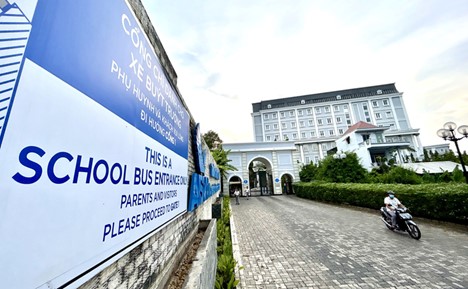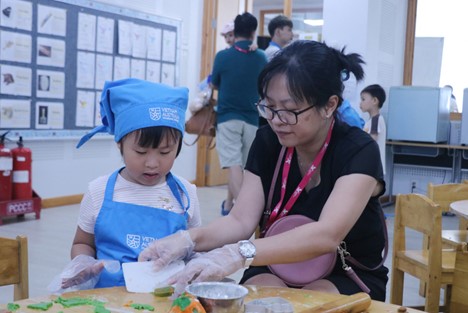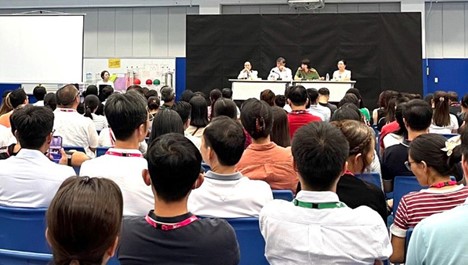Many international schools in Vietnam have mobilized huge capital from parents by launching so-called 'free education packages' or 'education investment packages' with opaque articles, putting parents at risk.
Such schools have implemented a controversial policy, requesting parents to contribute billions of Vietnamese dong for their children's education, under the guise of providing free schooling.
Assurances were made that parents would be reimbursed a significant portion, if not the entire sum, upon their children's graduation. (VND1 billion = US$39,800)
Experts have raised concerns over the issue and described it as a delayed-action bomb, adding that it is time to promulgate regulations to manage these schools’ capital mobilization.
They also advised parents to stay cautious and vigilant.
'Investment packages' a trend among int’l schools
At the American International School Vietnam (AISVN) in Nha Be District, Ho Chi Minh City, there was a time when over half of the parents joined its 'education investment packages.'
They lent the school VND3-5 billion (US$119,550-199,250) each without interest on the condition that the investments would be reimbursed after their children’s graduation. In return, AISVN offered free training programs to the students.
Such 'education investment packages' are no longer new in Vietnam. In Ho Chi Minh City alone, an estimated 10 international schools offer such packages.
As a case in point, the U.S. Vietnam Talent International School offers VND2-billion ($79,687) packages to parents whose children attend the school's English program meeting the U.S.’s Common Core State Standards and VND2.75-billion ($109.570) packages for its Oxford international curriculum.
Parents would pay the amounts once and take back the entire sums after their children’s graduation, the school pledged.
The I Can School (ICS) system employs a similar pattern in the ongoing 2023-24 academic year. Parents will pay the entire tuition fees, at about VND1.2 billion ($47,773), for their children’s nine school years, including five years at the elementary level and four years at the middle school level, at the enrollment time.
The school is committed to returning 80 percent of the tuition fees, or over VND1 billion ($39,800) per student, after they complete nine school years at ICS.
Cao Huy Thao, former principal of the Saigon International College, said international schools collect tuition fees in line with the government's regulations but they operate as companies.
Pursuant to the Enterprise Law and the Investment Law, these schools are allowed to mobilize capital, paving the way for the launching of 'education investment packages.' A way to pay interest on these packages is offering tuition fee reductions or exemptions.
In reality, private schools find it easier to borrow money from parents than companies in other sectors as the parents have high confidence in the education sphere, according to Associate Professor Dr. Nguyen Huu Huan from the University of Economics Ho Chi Minh City.
Regarding proposals to ban 'education investment packages,' Huan said they were unfeasible and unreasonable as the capital is sourced on a voluntary basis. If schools use the capital for the committed purposes, the packages will benefit parents.
|
|
| An AISVN student during a class. Photo: Trong Nhan / Tuoi Tre |
Risky investments
Late last month, the closure of AISVN grabbed headlines as teachers went on strike due to unpaid salaries and insurance. Concerned parents expressed worries about the continuity of their children's education at the school.
Bui Khanh Nguyen, an authority on international schools, highlighted that the majority of underlying crises in international schools stem from issues within their administration.
Some schools want to quickly earn profits, while their financial capacity is not strong enough, so they expand their scale too fast.
Business ambitions may lead to negligence in education responsibilities. In other words, schools may fail to have enough high-quality teachers and provide opaque information to parents and students.
Dr. Nguyen Thi Thu Huyen, formerly a principal at several international schools in Ho Chi Minh City, noted a concerning trend of escalating tuition fees among international schools.
She emphasized that this trend exploits parents' eagerness to provide their children with an international educational experience featuring foreign teachers at relatively low tuition costs.
To offer competitive tuition fees, schools cut some costs, typically expenses for teacher employment, besides launching investment packages.
Teachers at high-quality schools may earn VND1.5-2 billion ($59,716-79,622) each per year and enjoy many welfare benefits. These schools almost never offer investment packages or tuition fee reductions or exemptions.
Meanwhile, many other schools that provide low tuition or preferential 'education investment packages' often have low standards for teachers. Some schools pay a foreign teacher only VND45 million ($1,792) per month and offer no allowances, Huyen informed.
She advised parents to weigh carefully and agree to spend money if they want their children to study international curricula.
Citing the case of the Apax Leaders English language center chain, Dr. Huan from the University of Economics Ho Chi Minh City said that the chain's operator, Egroup, relies heavily on investor loans for its operations.
This capital mobilization not only facilitates the expansion of its educational services but also enables the group to diversify into other sectors such as healthcare, cuisine, and financial investment.
The chain had collected tuition fees for long-term courses but failed to arrange classes. It later failed to refund the tuition fees to parents and currently owes teachers and employees tens of billions of Vietnamese dong as well.
Like other investment channels, parents themselves should be aware of risks and should not put all their faith in schools, Huan noted, warning that 'education investment packages' are booming due to the current low deposit rates at banks.
As schools’ leaders are not professional investors, it is risky if they use the mobilized money for investment in other sectors, the expert said.
He added that parents should keep a close watch on schools’ use of their money.
Bui Khanh Nguyenshared the view that private schools bear educational functions but operate for profit. They are owned by companies or operate as normal businesses.
Enterprises encounter stringent regulations when mobilizing capital through share and bond issuances or seeking loans from banks. In contrast, private schools have been able to gather significant sums, amounting to trillions of Vietnamese dong, through opaque and loosely regulated contracts with parents.
Nguyen proposed a two-fold approach to address issues within international schools. He recommended that education management agencies oversee education-related matters, while specialized agencies should be tasked with regulating capital mobilization activities within schools.
|
|
| AISVN held a meeting with parents on March 30, 2024 with the attendance of leaders of the Ho Chi Minh Department of Education and Training. Photo: Dao Thu / Tuoi Tre |
Stricter management required
A leader of the municipal Department of Education and Training told Tuoi Tre (Youth) newspaper that the city is now home to 35 foreign-invested schools and some 100 private schools.
The department needs other agencies’ cooperation to manage these schools’ capital mobilization and financial investments.
Cao Huy Thao, former principal of the Saigon International College, said the Ministry of Education and Training and other relevant ministries and agencies should update regulations on the management of international and private schools.
According to Nguyen Nhat Minh from the Research Institute for Banking of the Banking Academy, it is extremely risky if schools use the money mobilized from parents to invest in real estate or stocks.
To prevent such investments, parents should require schools to provide information about their financial state and make commitments to the use of the money.
If schools are on the verge of bankruptcy, parents can ask competent authorities to block the schools’ assets for loan payments in line with the law.
If schools fail to make payments, parents can request investigation agencies to clarify if the schools have appropriated assets or not, or even file lawsuits against them.
Vietnam does not ban or limit schools from borrowing money from parents, said lawyer Truong Thanh Duc, director of ANVI Law Firm.
Schools, with the prestige of the education sector, find it easier to mobilize capital from parents.
Securing funds from parents proves to be a simpler alternative to accessing bank loans.
Banks typically demand collateral, stringent eligibility criteria, and assurance of repayment capability, often imposing loan caps.
Like us on Facebook or follow us on Twitter to get the latest news about Vietnam!




















































